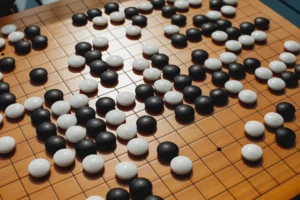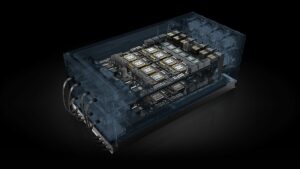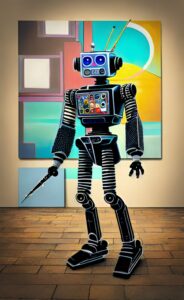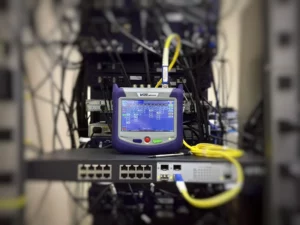AI and machine learning have undoubtedly captured the attention of the tech world and we are closer to AI-quantum computing than we thought.
The buzz around AI and machine learning isn’t just hype anymore; it’s the soundtrack to a rapidly evolving landscape. From self-driving cars weaving through our streets to robots assisting in delicate surgeries, the applications are already changing our world. And amidst this exciting wave, another force is gathering momentum: the fusion of AI and quantum computing.
While the concept of AI-quantum computing might sound like science fiction, the reality is surprising. We’re closer to achieving this groundbreaking synergy than many expected. Advancements in both fields are happening at a breakneck pace.

What is AI-quantum computing?
AI-quantum computing is the fusion of two of the buzziest terms in technology: machine learning and quantum computers.
In one corner, we have artificial intelligence (AI), the art of creating intelligent machines that can learn, reason, and understand the world around them. AI algorithms, powered by mountains of data, can decipher patterns, make predictions, and even generate creative content. They’re behind the self-driving cars navigating our streets, the personalized recommendations filling our screens, and the medical insights revolutionizing healthcare.
In the other corner stands quantum computing, a technology that harnesses the counterintuitive principles of the quantum world. Unlike traditional computers that rely on bits (either 0 or 1), quantum computers employ qubits, which can exist in a superposition of both states simultaneously. This bizarre ability allows them to explore vast numbers of possibilities in parallel, tackling problems that would take classical computers eons to solve.
But what happens when these two giants collide? That’s where the excitement of AI-quantum computing takes center stage. This marriage of minds and mechanics holds the potential to:
- Supercharge machine learning:
- Imagine training AI models in a fraction of the time, uncovering hidden patterns in data too complex for classical algorithms, and optimizing models with unprecedented precision. This could lead to AI breakthroughs in drug discovery, materials science, and even climate modeling
- Unlock the quantum realm:
- AI can act as a bridge between the classical and quantum worlds, helping us design and evaluate algorithms specifically for quantum computers. By developing tailored AI tools, we can unlock the immense potential of quantum simulations, accelerating advancements in fields like chemistry, finance, and cryptography
- Solve the unsolvable:
- Certain problems, like factoring large numbers or deciphering complex protein structures, remain intractable for classical computers. AI-quantum computing might be the key to tackling these head-scratchers, opening doors to groundbreaking discoveries in mathematics, cryptography, and biomedicine
Of course, this futuristic vision comes with its own set of challenges. Building and maintaining reliable AI-quantum computing is still a technological hurdle, and integrating them seamlessly with existing AI frameworks is no small feat. The very nature of quantum mechanics introduces noise and errors, demanding sophisticated error correction techniques.
Despite these obstacles, the field is progressing at breakneck speed. Advances in quantum hardware, software development, and AI algorithms are paving the way for practical applications. Research teams around the world are actively designing hybrid quantum-classical algorithms, testing them on real-world problems, and pushing the boundaries of what’s possible.

While the success of AI-quantum computing remains to be seen, the potential rewards are undeniable. This collaborative venture could unleash a new era of scientific discovery, technological innovation, and human progress. It’s a story still being written, but one that promises to rewrite the very notion of what computers can achieve.
So, the next time you hear about AI and quantum computing, remember this: it’s not just about bits and bytes, algorithms and circuits. It’s about a powerful synergy, a fusion of minds and mechanics, with the potential to reshape the world we live in.
How close are we?
It’s difficult to predict exactly when AI-quantum computing will become a reality, as it’s a complex field that requires significant advances in both AI and quantum computing. However, researchers are actively working on developing the necessary technologies and algorithms, and some experts believe that we could see the first practical applications of AI-quantum computing within the next 5-10 years.
There are several challenges that need to be overcome before AI-quantum computing can become a reality, including the development of reliable and scalable quantum computing hardware, the creation of quantum algorithms that can solve real-world problems, and the integration of quantum computing with classical AI systems.
Despite these challenges, many experts believe that AI-quantum computing has the potential to revolutionize many areas of research and industry, and there is significant investment and research being done in this field. For example, Google, IBM, and Microsoft are all actively working on developing quantum computing hardware and algorithms, NVIDIA has recently unveiled their superchips and there are several startups and research institutions working on AI-quantum computing applications.
What if?
The convergence of artificial intelligence (AI) and quantum computing holds immense potential to revolutionize industries and transform our lives. This potent combination could tackle previously intractable problems and drive unprecedented innovation across various fields.
Imagine personalized medicine tailoring treatments to individual genomes, materials science designing revolutionary substances with unheard-of properties, or finance predicting market fluctuations with uncanny accuracy. AI-quantum computing could unlock these possibilities, accelerating drug discovery, optimizing supply chains, and creating next-generation solar cells.
Education could be radically personalized, with AI-powered tutors adapting to each student’s needs and preferences. Climate change mitigation strategies could be vastly improved through accurate modeling and resource management. Even mundane tasks like traffic management and entertainment recommendations could be optimized, leading to smoother commutes and personalized content experiences.
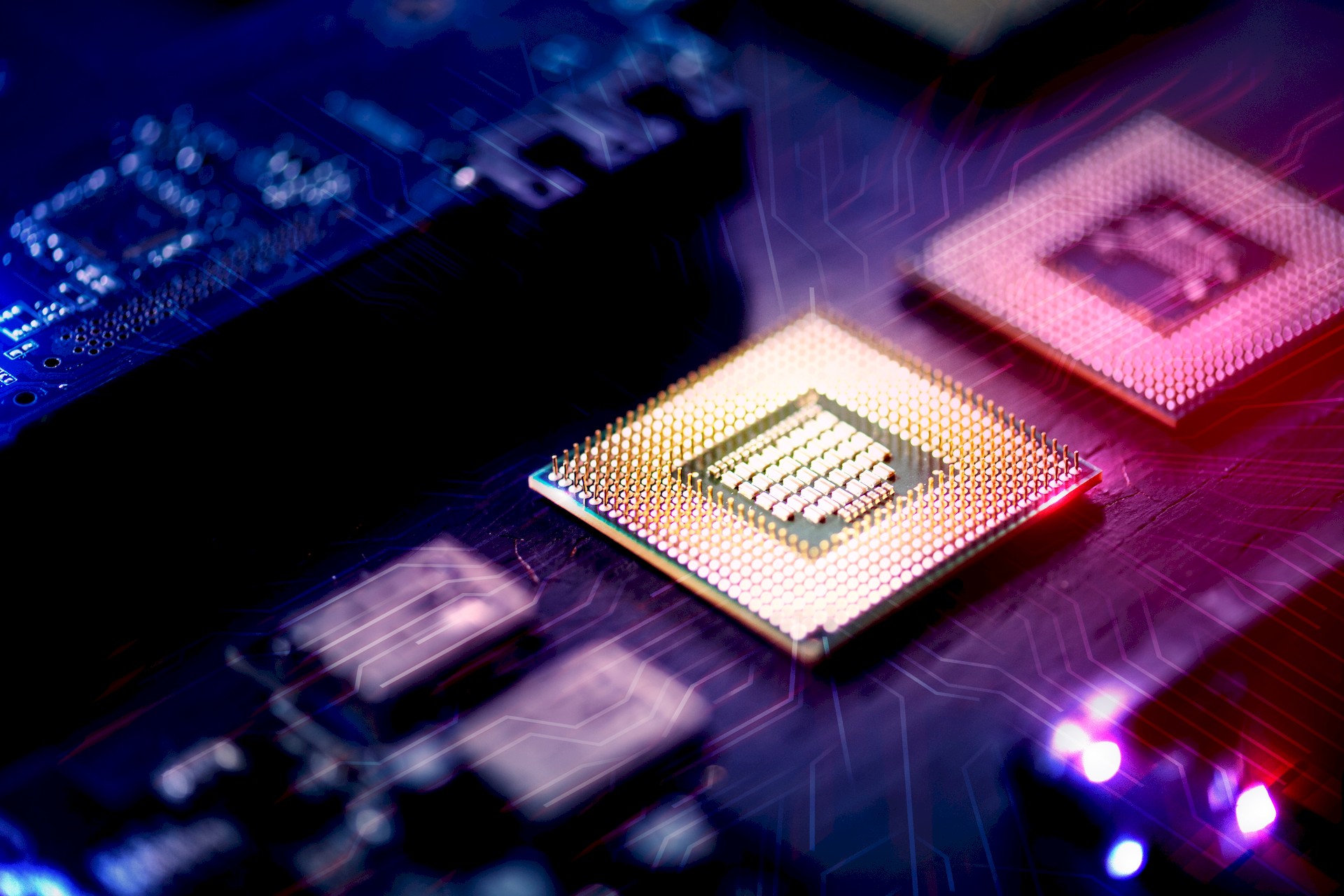
This transformative potential comes with challenges. Automation through AI could lead to job losses, necessitating reskilling and adaptation programs. Ensuring fairness and mitigating bias in AI algorithms will be crucial to prevent discrimination in loan approvals or criminal justice. Robust data privacy and security regulations are needed to address potential breaches and protect individual information.
Achieving true AI-quantum computing will take time, significant research, and careful ethical considerations. But the potential benefits are immense, with the potential to solve some of humanity’s most pressing challenges and improve our lives in unimaginable ways. Ultimately, the future of AI-quantum computing depends on how we choose to develop and utilize this powerful technology, ensuring it serves the betterment of humanity.
Who knows? Maybe Open AI’s Q-star is the first small step we have taken for it.
Featured image credit: benzoix/Freepik.
- SEO Powered Content & PR Distribution. Get Amplified Today.
- PlatoData.Network Vertical Generative Ai. Empower Yourself. Access Here.
- PlatoAiStream. Web3 Intelligence. Knowledge Amplified. Access Here.
- PlatoESG. Carbon, CleanTech, Energy, Environment, Solar, Waste Management. Access Here.
- PlatoHealth. Biotech and Clinical Trials Intelligence. Access Here.
- Source: https://dataconomy.com/2024/01/03/what-is-ai-quantum-computing-how-close/
- :has
- :is
- :not
- :where
- 1
- a
- ability
- About
- accelerating
- accuracy
- accurate
- Achieve
- achieving
- across
- Act
- actively
- adaptation
- address
- advancements
- advances
- AI
- AI models
- AI systems
- AI-powered
- AI-quantum
- algorithms
- All
- allows
- already
- amidst
- and
- Another
- anymore
- applications
- approvals
- ARE
- areas
- around
- Art
- artificial
- artificial intelligence
- Artificial intelligence (AI)
- AS
- assisting
- At
- attention
- Automation
- BE
- become
- before
- behind
- being
- believe
- benefits
- Betterment
- between
- bias
- both
- boundaries
- breaches
- breakthroughs
- BRIDGE
- brink
- Building
- but
- by
- CAN
- captured
- careful
- cars
- Cells
- Center
- center stage
- chains
- challenges
- change
- changing
- chemistry
- Choose
- Climate
- Climate change
- Close
- closer
- collaborative
- Collide
- combination
- combines
- comes
- Companies
- complex
- computers
- computing
- concept
- considerations
- content
- Convergence
- Corner
- could
- course
- Creating
- creation
- Creative
- Criminal
- criminal justice
- crucial
- cryptography
- data
- data privacy
- Data Privacy and Security
- Decipher
- demanding
- depends
- Design
- designing
- develop
- developing
- Development
- difficult
- discovery
- Discrimination
- done
- doors
- dream
- drive
- drug
- drug discovery
- each
- either
- ensuring
- Entertainment
- Era
- error
- Errors
- ethical
- evaluate
- Even
- evolving
- exactly
- example
- Excitement
- exciting
- exist
- existing
- expected
- Experiences
- experts
- experts believe
- explore
- factoring
- fairness
- faster
- feat
- Fiction
- field
- Fields
- filling
- finance
- First
- fluctuations
- For
- Force
- fraction
- frameworks
- from
- fusion
- future
- futuristic
- gathering
- generate
- giants
- great
- groundbreaking
- Happening
- happens
- Hardware
- Have
- healthcare
- hear
- helping
- Hidden
- High
- holds
- How
- However
- HTTPS
- human
- Humanity
- hurdle
- Hybrid
- hybrid quantum-classical
- Hype
- IBM
- if
- image
- immense
- improve
- improved
- in
- Including
- individual
- industries
- industry
- information
- Innovation
- insights
- institutions
- Integrating
- integration
- Intelligence
- Intelligent
- Introduces
- investment
- IT
- ITS
- Job
- jpg
- just
- Justice
- Key
- knows
- landscape
- large
- lead
- leading
- LEARN
- learning
- like
- live
- Lives
- loan
- losses
- machine
- machine learning
- Machines
- maintaining
- make
- Making
- management
- many
- Market
- materials
- mathematics
- max-width
- maybe
- mechanics
- medical
- Microsoft
- might
- minds
- mitigating
- mitigation
- modeling
- models
- Momentum
- most
- Nature
- navigating
- necessary
- Need
- needed
- needs
- New
- next
- next-generation
- no
- Noise
- Notion
- numbers
- Nvidia
- obstacles
- of
- on
- ONE
- opening
- optimized
- optimizing
- or
- Other
- our
- Overcome
- own
- Pace
- Parallel
- patterns
- Paving
- Personalized
- plato
- Plato Data Intelligence
- PlatoData
- possibilities
- possible
- potent
- potential
- powered
- powerful
- Practical
- Practical Applications
- Precision
- predict
- predicting
- Predictions
- preferences
- pressing
- prevent
- previously
- principles
- privacy
- Privacy and Security
- problems
- Programs
- Progress
- progressing
- promises
- properties
- protect
- Protein
- Pushing
- Quantum
- quantum algorithms
- quantum computers
- quantum computing
- Quantum Mechanics
- qubits
- radically
- rapidly
- real world
- Reality
- reason
- recently
- recommendations
- regulations
- reliable
- rely
- remain
- remains
- remember
- requires
- research
- Research Institutions
- researchers
- reshape
- reskilling
- resource
- revolutionary
- revolutionize
- Revolutionizing
- Rewards
- robots
- robust
- scalable
- Science
- Science Fiction
- scientific
- screens
- seamlessly
- security
- see
- seen
- self-driving
- serves
- set
- several
- significant
- simultaneously
- small
- smoother
- Software
- software development
- solar
- Solar cells
- SOLVE
- some
- sophisticated
- Sound
- soundtrack
- specifically
- speed
- Stage
- stands
- Startups
- States
- Step
- Still
- Story
- strategies
- streets
- structures
- success
- superposition
- supply
- Supply chains
- surprising
- synergy
- Systems
- tackle
- tackling
- tailored
- tailoring
- Take
- taken
- takes
- tasks
- teams
- tech
- tech companies
- techniques
- technological
- Technologies
- Technology
- terms
- Testing
- than
- that
- The
- The Future
- the world
- their
- Them
- There.
- These
- this
- thought
- Through
- time
- to
- too
- tools
- traditional
- traffic
- Training
- Transform
- transformative
- treatments
- true
- two
- Ultimately
- undeniable
- understand
- undoubtedly
- unimaginable
- unleash
- unlike
- unlock
- unprecedented
- unveiled
- us
- utilize
- Utilizing
- various
- Vast
- venture
- very
- vision
- Wave
- Way..
- ways
- we
- What
- when
- which
- will
- with
- working
- world
- world’s
- would
- written
- you
- zephyrnet





